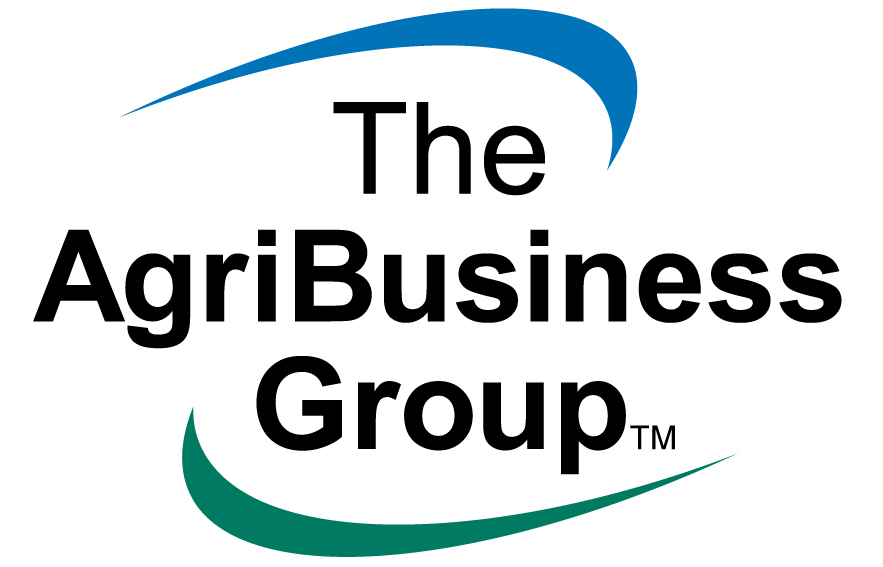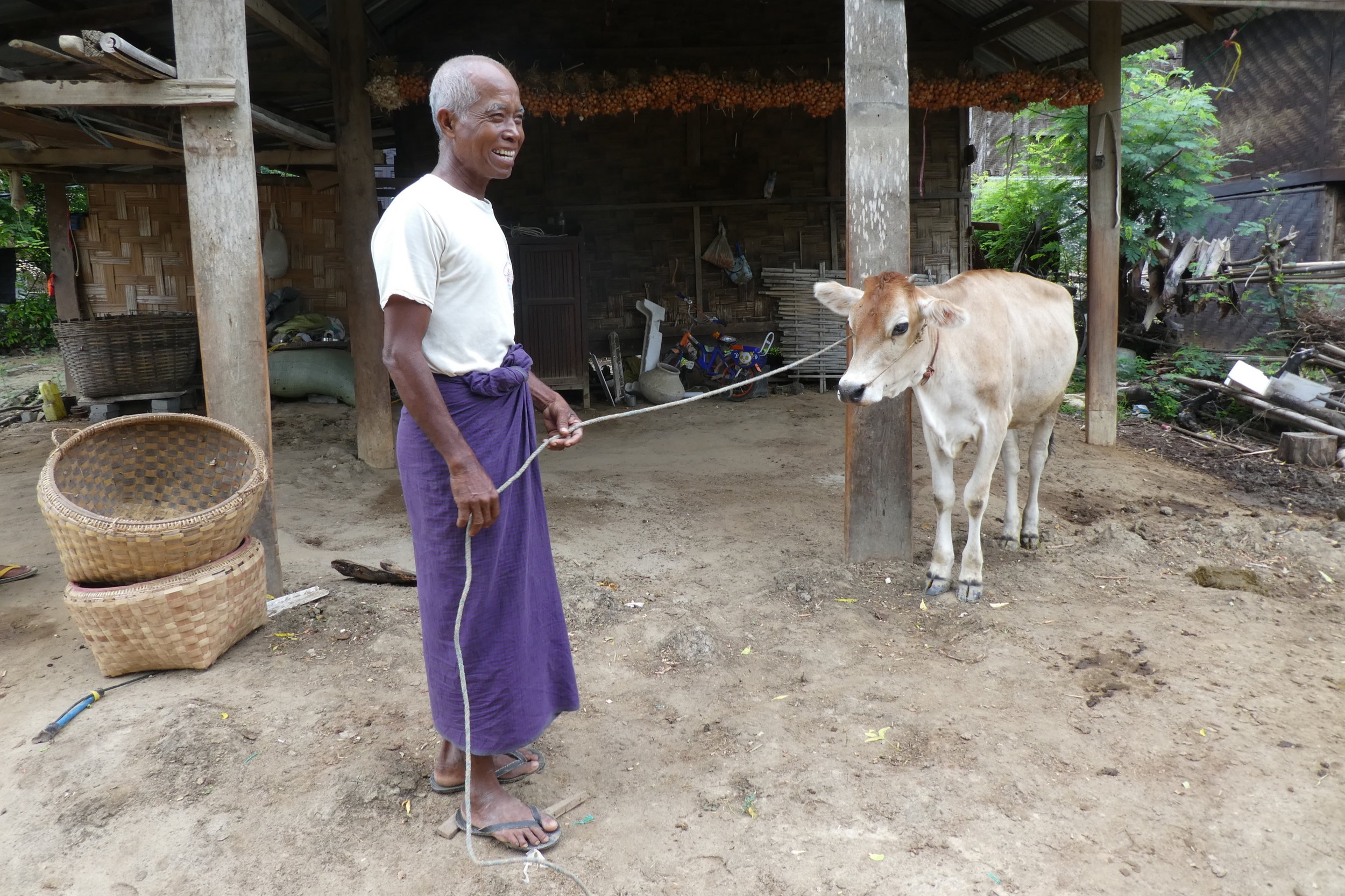Changing Myanmar farms and livelihoods - an update from the field
The Myanmar Dairy Excellence Project is empowering Myanmar dairy farmers and their families by promoting good farming practices. Follow along Shaun Snoxell, the Dairy Advisor of the project, for an ordinary day at work alongside Myanmar farmers and find out how small changes to traditional methods can substantially improve farm profits and the wellbeing of the community, the animals and the environment.
U Tun Myint proudly shows off his NZ Jersey crossbred heifer, the offspring of MDEP provided semen
Our driver flicks the Ranger into 4WD. The rainy season is upon us up here in the Shan highlands of Myanmar (Burma), and the track is a bit greasy. Clouds hang low over the mountains in the background. Bumping along the road, we pass by farmers hitching their buffalo up for the days ploughing, who watch through the veil of rain dripping slowly off their conical bamboo hats. We come into a little village looking over the rice paddy and pull to a stop. Jumping out, my counterpart and I greet the waiting farmer, "Mingalabar! Ne kaung lar?".
This is another regular work-day, out providing technical advice to Myanmar dairy farmers. I work for The Agribusiness Group's 'Myanmar Dairy Excellence Project', in short MDEP. This project is a partnership between the governments of Myanmar and New Zealand to develop the Myanmar dairy industry. We aim to help build a profitable and competitive Myanmar dairy industry, which provides quality livelihoods for farmers, and safe food for consumers. The project is broad in scope, but a large part of what we do is to provide information to farmers on how they can improve farm profitability, production, animal welfare and milk quality. We spend a lot of the time on the road around Myanmar, visiting our 'focus farmers' and running village-level discussion groups. Our vision is that these 'focus farmers' will benefit from improved farm management, and then act as demonstration farms within their own communities.
Today we are in Hsipaw (pronounced 'see-paw') and have just arrived at U Khin Maung Myint's farm. U Khin's farm is typical of a lot of the farmers we work with. He has four adult cows and a few heifers. His animals are tied up to a post all day, and rather than grazing freely they have their feed brought to them. Most of the year their diet is based on rice straw, an extremely poor quality feed. To meet the cows feed requirements, U Khin must buy expensive concentrate feeds, resulting in a high cost but low-quality diet. Myanmar dairy farms produce, on average, about 10 litres of milk per cow per day, far below a dairy cow's potential production. The typical farm system is increasingly becoming unprofitable, as feed prices increase and milk prices are pushed down by imports and artificial creamers. These traditional farms also often have some real animal welfare issues.
However, U Khing Maung Myint is changing! He has leased some land to grow forage maize and intends to plant a high-quality tropical grass called Mombasa on the one-acre he owns. Unlike the typical farmer, he gives his cows 24/7 access to water and is improving the genetics of his herd by artificially inseminating his cows with imported NZ dairy semen. He is planning on building a simple effluent system to prevent pollution of the local stream and retain fertility on-farm. While he is struggling to achieve heifer growth rate and cow weight targets until he starts harvesting his newly planted grass, he is aware of the impact of good nutrition on his farm profitability. U Khin has been empowered to slowly begin a process of change during two years of regular visits and support from the MDEP team.
At the core of MDEP's work is a principle familiar to New Zealand dairy farmers; maximising the profit margin per litre of milk produced. Monitored 'focus farms' within the project saw a 19% increase in their profit margin between August 2017 and February 2019, with the bulk of this increase coming from farmers that have adopted MDEP-recommended practices. Rather than pushing for increased cow numbers and milk yield, we are promoting changes that increase total farm profit, while also considering needs of the family and the wider community. Our work promotes 'innovations' to both increase total milk yield and reduce cost. The key to this system is utilising low-cost, high-quality tropical forages such as Mombasa grass and sorghum to improve cow nutrition. Only improved cow nutrition can lead to increased milk yield, faster heifer growth rates, better cow reproductive performance, and better animal welfare. Good animal husbandry practices, calf rearing, hygienic milking, feed management, silage making etc. are also critical for a profitable farm of any scale. In addition, the project considers the environmental impact of the farms, promoting nutrient retention systems to minimise effluent pollution and reduce fertiliser requirements. An independent report by AgResearch (2018, unpublished) suggested that the greenhouse gas footprint decreased 27% per litre of milk produced for a Baseline farm within the project.
It's hard not to get excited about the progress of people like U Khin. He is currently making a profit of just NZ$551 a month from his farm, but the changes he is making are slowly improving his livelihood. More than that, as an 'early adopter', other farmers are watching and waiting to see how the innovations he is implementing are working out for him. Once new concepts are proved, the innovation slowly diffuses out, changing the lives of more farmers than we can directly reach ourselves.
It is a privilege to be in Myanmar at this stage of development of this project and to work alongside Myanmar farmers every day. The Agribusiness Groups' work in Myanmar is slowly changing an industry, but more importantly, improving the lives of individual farmers and their communities.
Click here to find out more about the Myanmar Dairy Excellence Project.

